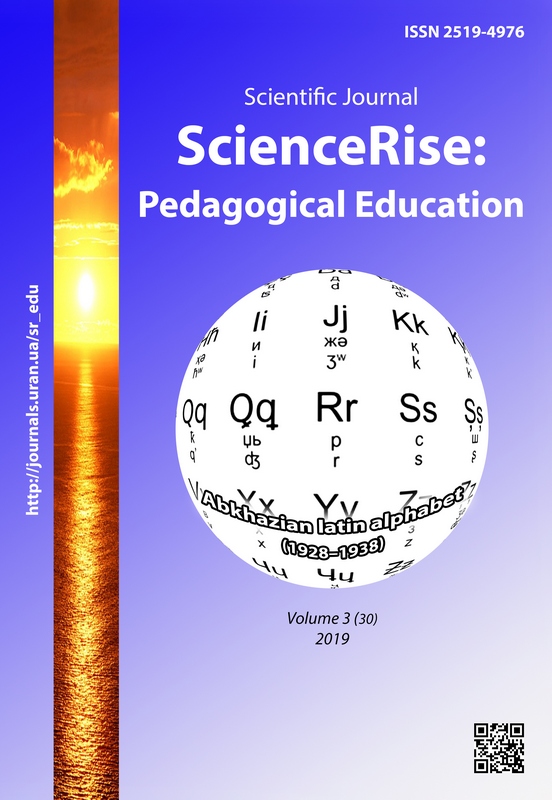Forming professional mobility of future pedagoges in conditions of pedagogical college
DOI:
https://doi.org/10.15587/2519-4984.2019.169604Keywords:
professional mobility, structure, conditions of formation of professional mobility, career guidance, adaptation, criteriaAbstract
The article is devoted to the issues of professional mobility formation of future primary school teachers. The essence of the concept "professional mobility" is defined, and the content analysis of the concept in scientific sources is conducted. We consider professional mobility of students as an integrative quality of the individual which allows: to get a qualitative solution of professional tasks in the established timeframes using the most effective technologies of future professional activity; to develop independently new technologies of professional activity on the speciality or related speciality, if necessary; to be active and communicatively competent in different situations.
The pedagogical conditions of the group of pedagogical factors of future teachers’ professional mobility formation in the pedagogical college are considered and the groups of approaches to the process of future teachers’ professional mobility formation are defined as: pedagogical, psychological, psychological and pedagogical, socio-economic. The pedagogical conditions, revealed in the article, are analysed as an integral part of the pedagogical system: they reflect various possibilities that influence the personal and professional aspects of the system, contributing to its successful functioning. The pedagogical conditions for the future teachers’ professional mobility formation in the conditions of the pedagogical college include: the creation of an innovative educational environment in the college, the formation of students’ creative activity, the implementation of the system-integrative organization of training students to the formation of students' professional mobility on the basis of systemic, synergetic, competence and subjective approaches .
The author reveals the structure of future teachers’ professional mobility formation in a pedagogical college. The components of the structure of the future teacher’s professional mobility are described. The criteria, indicators and levels of students’ professional mobility formation in the pedagogical college are defined and described
References
- Korobko, N. V. (2016). Formuvannia profesiinoi mobilnosti maibutnikh mahistriv pedahohiky vyshchoi shkoly. Theory and methods of educational management, 1 (17), 4–14
- Sushentseva, L., Shevchuk, H., Dolnikova, L. (2016). Profesiina mobilnist pedahoha yak umova yoho konkurentozdatnosti na suchasnomu rynku osvitnikh posluh. Molod i rynok, 5, 6–12. URL: http://nbuv.gov.ua/UJRN/Mir_2016_5_3
- Grevceva, G. Ia., Balikaeva, M. B. (2016). Razvitie professionalnoi mobilnosti budushchikh inzhenerov v socialno kulturnoi srede VUZa. Sovremennye problemy nauki i obrazovaniia, 5, 4–6.
- Slastenin, V. A., Isaev, I. F., Shiianov, Е. N.; Slastenin, V. A. (Ed.) (2013). Pedagogika. Moscow: Izdatelskii centr "Akademiia", 576.
- Igoshev, B. M. (2014). Organizacionno-pedagogicheskaia sistema podgotovki professionalno mobilnykh specialistov v pedagogicheskom universitete. Еkaterinburg, 201.
- Zeer, E. F. (2014). Mnogoznachnost fenomena mobilnost v professionalnom obrazovanii. Available at: http://elar.rsvpu.ru/bitstream/123456789/670/1/spm_2014_04.pdf
- Nuzhnova, S. V. Sushchnost i struktura poniatiia professionalnoi mobilnosti v sovremennom obshchestve. Available at: http://www.rusnauka.com/Pedagog/185.html
- Karelova, R. A. (2016). Metodolohichni zasady formuvannia hotovnosti do profesiinoi mobilnosti u studentiv koledzhu. Aktualni problemy rozvytku svitovoi nauky. Kyiv: Tsentr naukovykh publikatsii, 55–58.
- Zeer, E. F. (2014). Socialno-profesionalnaia mobilnost uchashcheisia molodezhi kak faktor podgotovki k dinamicheskomu professionlanomu budushchemu. Obrazovanie i nauka, 8, 33–48.
- Piletska, L., Wawak, T. (2017). Professional Mobility of Student’s Youth. Journal of Vasyl Stefanyk Precarpathian National University, 4 (1), 34–41. doi: http://doi.org/10.15330/jpnu.4.1.34-41
- Storo, J. (2012). The Difficult Connection between Theory and Practice in Social Pedagogy. The International Journal of Social Pedagogy. London: The Pra Social Pedagogy and the Centre for Understanding Social Pedagogy, Institute of Education, University of London, 17–29. doi: http://doi.org/10.14324/111.444.ijsp.2012.v1.1.003
- Węgrzyn, G. (2016). Mobilność zawodowa a sytuacja na rynku pracy, Studia ekonomiczne. Zeszyty Naukowe Uniwersytetu Ekonomicznego w Katowicach, 276, 137–147.
- Piletska, L. S. (2014).The Professional Mobility of the Personality: Social and Psychological Aspect. Luhansk: Knowledge Publishing House.
- Stakhiv, M., Boiko, H. (2017). Sociocultural Component of Teachers’ Professional Competence. Journal of Vasyl Stefanyk Precarpathian National University, 4 (1), 110–116. doi: http://doi.org/10.15330/jpnu.4.1.110-116
Downloads
Published
How to Cite
Issue
Section
License
Copyright (c) 2019 Valerii Ruzhytskyi

This work is licensed under a Creative Commons Attribution 4.0 International License.
Our journal abides by the Creative Commons CC BY copyright rights and permissions for open access journals.
Authors, who are published in this journal, agree to the following conditions:
1. The authors reserve the right to authorship of the work and pass the first publication right of this work to the journal under the terms of a Creative Commons CC BY, which allows others to freely distribute the published research with the obligatory reference to the authors of the original work and the first publication of the work in this journal.
2. The authors have the right to conclude separate supplement agreements that relate to non-exclusive work distribution in the form in which it has been published by the journal (for example, to upload the work to the online storage of the journal or publish it as part of a monograph), provided that the reference to the first publication of the work in this journal is included.








